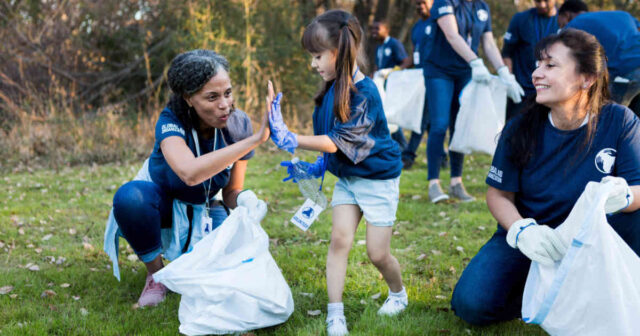
In an increasingly interconnected world, the essence of human support and communal harmony can’t be underestimated. Social work’s key role is empowering individuals and fostering a sense of community. According to a report, over 700,000 registered social workers in the U.S. are on the front lines, enhancing community resilience, providing crucial support, and paving the way for societal change.
Doing so takes strategies, dedication, and an in-depth understanding of community dynamics. This article outlines eight impactful ways to make a difference in your community through social work.
1. Educating and Empowering Individuals

Social work is an empowering profession. The core of its mission lies in equipping individuals with an understanding of their rights and responsibilities and teaching them how to tap into available resources. This task is more than merely about imparting information; it’s about fostering resilience, cultivating self-reliance, and sparking the will for self-improvement.
Tools for this empowerment can be as straightforward as conducting informative workshops, one-on-one counseling, or group discussions to share experiences and insights. Empowering and educating individuals is a task that only a professional can undertake. Social workers can perform these duties even better with advanced skills gained through further education.
In this digital age, online education has improved accessibility and convenience, making it simpler for social workers to continue providing services while continuing their education. Undertaking programs, such as an MSW online program, can significantly enhance skills and ensure more effectiveness in the strategies.
2. Developing and Implementing Community Programs

Within communities, social workers create and initiate programs that span a variety of needs. From nurturing our young population through youth development initiatives to ensuring care and companionship for our elders, the scope of social work is comprehensive.
For example, social workers could spearhead mentorship programs by recognizing the need to guide at-risk youth towards a constructive path. These initiatives often provide a support system, guiding young individuals through challenging phases of life.
Similarly, another common responsibility might involve the setup of food banks for families with low income. These endeavors ensure that every community member has access to necessities.
3. Advocacy for Marginalized Groups

Advocating for marginalized groups is fundamental to a social worker’s mission. We dedicate ourselves to uplifting those on the periphery, fighting discrimination, and advocating for social justice. This commitment manifests in several ways.
Policy Change:
Social workers actively lobby for modifications in public policies. We aim to protect and empower marginalized communities through equity.
Raising Awareness:
Social change requires public awareness. Campaigns and events raise awareness of marginalized groups’ struggles, fostering empathy.
Direct Assistance:
We help people navigate social, economic, and legal systems. Marginalized people benefit greatly from this personalized support.
Through persistent advocacy, social workers strive to bring about a just society where everyone has an equal chance at success.
4. Enhancing Community Engagement

Social workers consistently strive to enhance community engagement, fostering an environment that fuels unity and collective responsibility.
Organizing local events is one such method. Social workers arrange various community activities, from neighborhood clean-ups to charity runs, that bring people together and nurture a spirit of camaraderie. These events also provide opportunities for individuals to contribute positively to their community.
Promoting volunteer opportunities is another means of engagement. Social workers connect community members with volunteer work that resonates with their skills and interests, further enhancing their sense of belonging.
Facilitating community meetings is also a common practice. These forums serve as platforms for open dialogue, where individuals can voice their thoughts, ideas, and concerns.
5. Providing Mental Health Support

As social workers, we are responsible for ensuring that members of our communities can access the resources we need to maintain and enhance their mental health. Here’s how we contribute:
Therapeutic Sessions: We conduct sessions to help individuals express their feelings, deal with emotional disturbances, and develop coping mechanisms.
Support Groups: Social workers arrange support groups where individuals with similar experiences can share, learn, and heal, creating a sense of community.
Connection to Resources: We are the crucial link between individuals and various mental health resources. We guide them to therapists, psychologists, or mental health centers that best suit their needs.
Social workers build resilient, happy, healthy communities by providing comprehensive mental health support.
6. Conducting Research to Improve Services
In our quest to identify the needs of our communities, social workers conduct comprehensive studies. These help us discern the most pressing issues that require immediate attention. Understanding these needs allows us to develop programs and interventions finely tuned to the community’s unique requirements.
Furthermore, we undertake a continuous evaluation of existing programs and interventions. This assessment ensures we can identify the successful strategies and replicate them in other contexts, while the less effective ones can be revised or replaced.
We also use research to generate novel strategies for community issues. We study similar problems in different contexts, borrow successful solutions, and adapt them to fit our community’s needs.
7. Promoting Economic Development

Social workers can leave a lasting impact on their communities by fostering economic development. We engage with various economic factors to ensure growth and prosperity and to alleviate poverty. Here’s a closer look at how we achieve this:
- Job Creation: We collaborate with local businesses, aiding in developing job opportunities that can lead to reduced unemployment.
- Employment Assistance: We assist individuals in securing employment, guiding resume writing, interview skills, and job hunting techniques.
- Policy Advocacy: We support policies that spur economic growth, ensuring a favorable environment for businesses and job seekers.
Our role in promoting economic development is a testament to the diverse ways social workers contribute to their communities.
8. Responding to Crises

Social workers stand as unwavering support pillars when crises strike, whether natural disasters, public health emergencies, or personal, familial upheavals. We are often among the first responders, extending a helping hand to those grappling with challenging circumstances.
In the face of natural disasters, social workers help coordinate relief efforts. We work alongside different organizations to ensure that affected communities receive timely aid, including food, shelter, or medical assistance.
Public health emergencies also see social workers in action. We serve as a crucial link between healthcare providers and the public, providing crucial information, dispelling myths, and guiding people toward necessary resources.
Even in personal crises, social workers assist families and individuals. We offer emotional support and guidance and help them navigate the maze of legal, medical, or administrative procedures they might face.
Conclusion
Social workers play diverse roles in fostering community well-being. They educate and empower individuals, develop community programs, advocate for marginalized groups, provide mental health support, and promote economic development. They make a difference by improving community engagement, researching, and responding to crises. Social work is a powerful vehicle driving community improvement and societal transformation.












